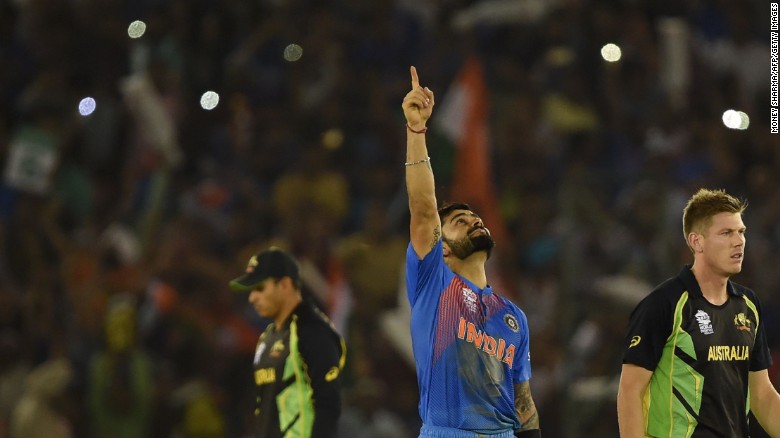Virat Kohli: My aggression is hard to control

When Indian cricketer Virat Kohli was 18, his father had a massive heart attack at 3am in the morning and died.
The young batsman was 40 not out overnight, in the grip of a game.
"I called my [Delhi] coach in the morning," Kohli, now 2, "I said I wanted to play, because for me not completing a cricket game is a sin.
"That was a moment that changed me as a person. The importance this sport holds in my life is very, very high."
Given his almost divine talent, it's probably fair to say that Kohli has become one of Indian cricket's gods.
Adored for his remorseless batting — Kohli single handedly took the Indian side to the semi-finals of the World Twenty20 this year — the cricketer is aware that his driven nature has its downsides.
His raw, uncensored on-pitch passion is considered by some parts of conservative Indian society as unnecessary aggression.
"My temper has been an issue for me," Kohli concedes. "It's been very hard to control at times."
Aggression or passion?
In February, Kohli was fined 30% of his match fee for verbally abusing the umpire after it was ruled he had been leg before wicket in an Asia Cup T20 match against Pakistan.
There have been confrontations with players, journalists, umpires and even the fans and it's become a sore point in India.
"When I came in," Kohli says, "I had tattoos, I used to dress up in a certain way, do things I felt were fine for me, but didn't go towards the typical moral behavior [of a cricketer in India.]
"But I knew in my heart I was working hard at my sport. There is no particular moral [code] for how you should think and … behave just because you are a cricketer.
"If you don't see the results there then you have the right to criticize."
Cultural change
Results have never been a problem for Kohli.
Nicknamed "the run machine", he has risen from leading his country's Under-19 team to victory at the 2008 World Cup to become India's international Test captain.
In 2014, he was named ICC World Twenty20 Player of the Tournament.
He is the second batsman in the world — the first being Sourav Ganguly — to have scored 1,000 or more ODI runs for four consecutive calendar years.
The confidence factor
Kohli says his self-belief holds up a mirror to the growing confidence of his generation in India.
In 2014, India had 356 million 10 to 24-year-olds, compared with China's 269 million, according to the United Nations.
The nation's youthful population has been called its biggest economic weapon.
Kohli speaks of a "cultural change" among his demographic, which is "going to help the whole nation."
"[If] you become more individual, [you] have more chance of succeeding … you have the chance of taking the national forward, because everyone has strong ideas.
"When we go abroad people are speaking about our country and are being surprised at how expressive we've become."
Rather than something to be apologetic for, Kohli believes aggression is something to utilize.
"I feel every sportsman should have that … killer instinct because you need to be proud of the ability you have … not in an arrogant way, but in a confident way.
"I am here, I am good enough, and I am going to express that because it helps me be the best I can be."
Price of fame
But there's a downside to being one of the most famous sportsmen in India — some days Kohli says he cannot even leave the house.
"When I think of having a house, I think of having everything inside it … because for me going out of the house even to have a meal is like a mission."
The price of fame, though, is one thing Kohli has managed to remain calm about.
"It used to irritate me, but I've come to accept the fact I have to stay in the house.
"It takes a lot of planning to go out."
Политика конфиденциальности | Правила пользования сайтом







